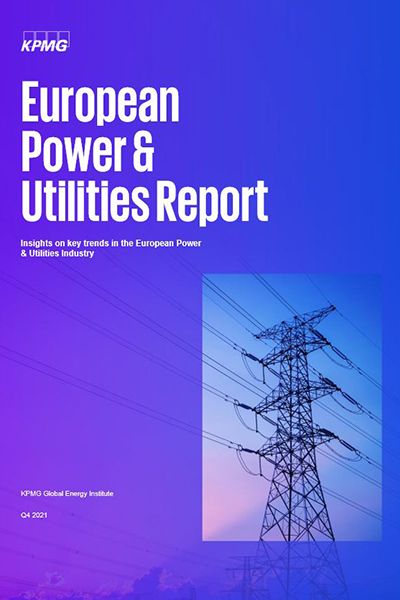In 2021, power prices in Europe recorded a steep gain due to increased electricity demand as the economies recovered from COVID-19. The increasing prices for coal and natural gas, infrastructure challenges, and geopolitical tensions in the region also pushed prices upward.
As a result, governments launched multiple interventions, including policy changes, tax cuts, subsidies, and price limits, in 4Q21 to protect consumers from the increasing energy prices.
The increasing prices have also accelerated the need for power market reforms in Europe and diversification of energy and fuel supplies to extend the bargaining power to purchasing countries.
In 4Q21, most of the 20 Power & Utilities (P&U) companies KPMG surveyed, reported an increase in revenue and share prices but a decrease in EBITDA. The increasing focus of these companies on renewable capacity development continued in this quarter, with increased activity around mergers, acquisitions, and new capacity additions.
The deal value of the European power and utility sector increased by 25 percent (on a q-o-q basis) to EUR25.4 million, thanks to the increased activity in the chemicals and power utility sub-sectors. The top five P&U M&A deals during 4Q21 accounted for 50 percent (EUR12.6 billion) of the overall deal value, marking the continuity of a well-established trend in the P&U sector.

European Power & Utilities Report Q4 2021
Download the latest insights on the European Power & Utilities Industry.
Download PDF (2.31 MB) ⤓
Regulatory developments in 4Q21: Key takeaways
In 4Q21, the government measures and initiatives focused on protecting consumers from the increasing energy prices in the region. As a result, the governments introduced multi-layered policy measures, such as tax cuts, subsidies, and price limits, to put off the crisis.
- The French government ordered EDF to sell cheaper nuclear power to smaller competitors (regulated access to historic nuclear energy, or ARENH mechanism) to limit the country's electricity prices. It will increase the nuclear electricity volumes from 100 TWh to 120 TWh in 2022. To its competitors, this nuclear electricity fixed price will only rise from EUR42.0/MWh to EUR46.2/MWh.
- The government has also introduced other measures, such as tax cuts, inflation allowances, and 'energy vouchers.' The plan will allow the price to increase by only 4 percent instead of the anticipated 35 percent.
- In October 2021, Spain introduced 'Royal Decree-Law 23/2021,' which focuses on urgent energy measures to protect consumers and introduce transparency in the wholesale and retail markets of electricity and natural gas.
- In December 2021, the Italian government published its Budget Law 2022 (Law n. 234), extending the validity of the 'Superbonus 110' incentive scheme, a tax deduction mechanism for energy upgrading and seismic retrofitting buildings up to a maximum of 110 percent.
The policymakers continued their focus on renewable energy development and transition towards sustainability by supporting the establishment of new sources, increasing investment, and revising the rules favoring renewable energy.
- Germany introduced an Ordinance for the revision of biomass electricity sustainability. It transposes sustainability criteria and criteria for greenhouse gas savings in electricity generation and biofuel production from biomass from the European parliament and council into national law.
- The UK introduced the 'heat and buildings strategy' in October, setting the ways it will decarbonize homes and commercial, industrial and public sector buildings to set a path to net-zero by 2050.
- In November, the UK government announced minimum funding of GBP20 million per year for tidal energy in the CfD. It will invest in tidal stream electricity as part of its fourth allocation round of the Contracts for Difference scheme.
Related Content
Connect with us
Stay connected
The email address you've entered is already tied to an existing account. Please enter your password to log in.
KPMG thought leadership is always available to our registered users
You’ve successfully logged in.
Please close this pop-up to return to the page.
Please provide the following information to register.

Follow us on LinkedIn
View regular energy content on our LinkedIn showcase page


